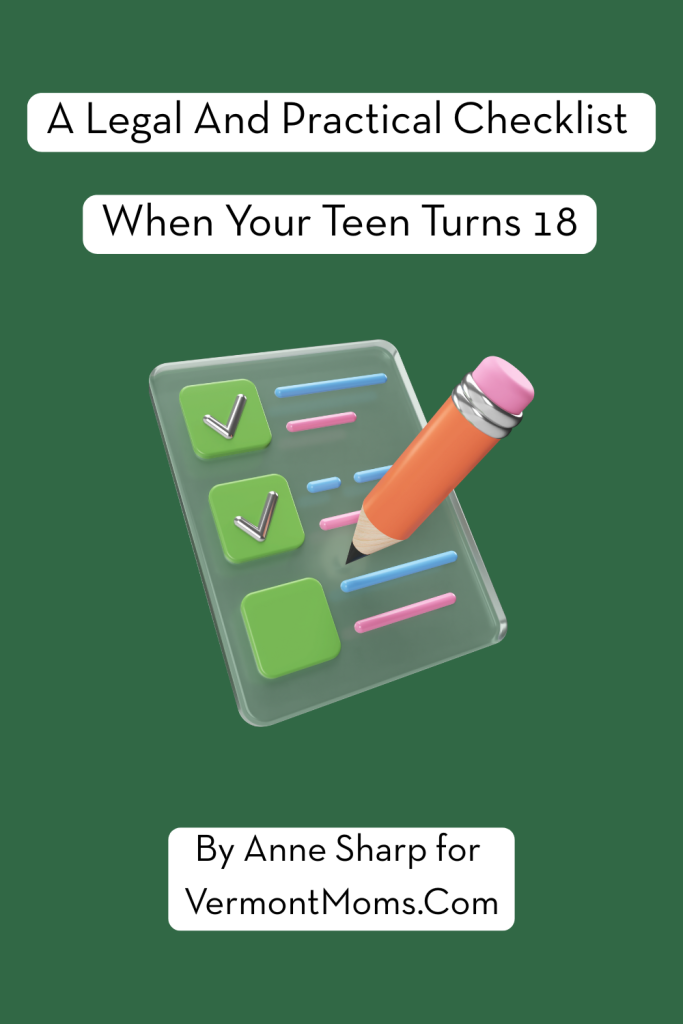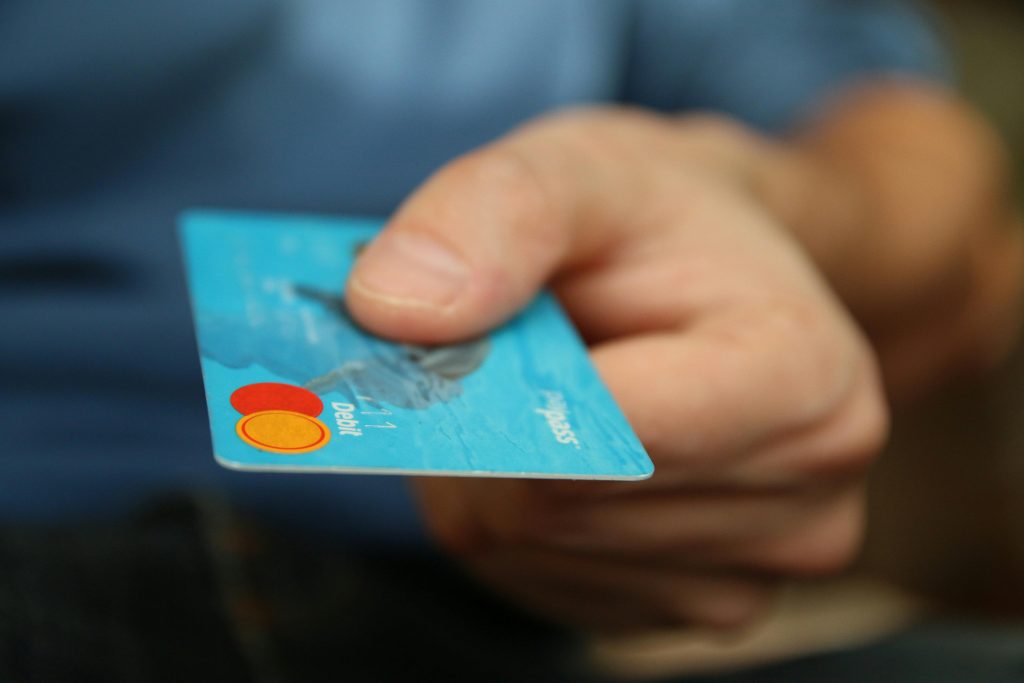Recently, my son had a milestone birthday – he turned 18! I thought I was ready for this big one: I planned a trip, cooked his favorite dinner, bought gifts, and did all of the things to celebrate. But I was a little shocked by all of the things we still needed to do. Because one day you’re helping your teen choose classes for next semester, and the next, they’re legally considered an adult.
Turning 18 is a huge milestone – both emotionally and legally. At 18, you can vote, run for office, go to war, get married, and buy a lottery ticket, for example. I don’t advise doing all of these things on one day, but legally, you could. It’s important
What many parents and teens don’t realize is how many behind-the-scenes changes happen the moment the clock strikes midnight on their 18th birthday. From losing parental access to medical records to needing new banking permissions, every parent needs a legal and practical checklist when your teen turns 18. You can thank me later.
Initially, turning 18 really doesn’t seem like a big deal. He was still living at home, just graduated from high school, and nothing was noticeably different. I raised him to be very independent, but I help him with finances, scheduling doctors’ appointments, and by reminding him of things.
But being an adult comes with a whole list of responsibilities that no one tells you about – not the school, the doctor, or even your friends or parents. No “Welcome to Adulthood” email arrives at midnight when your teen turns 18. No legal and practical checklist when your teen turns 18 actually exists outside of this post. So if your child is in kindergarten, put a pin in this list and keep it handy! You never know how fast time will fly!
Some things, like registering for Selective Service, were not even on my mind. After all, I grew up in a house of women; we never registered, and no one told us to. But not doing it? It’s against the law!
While he’ll always be my baby, I had to realize that legally, he isn’t anymore. My parental rights disappeared overnight – unless he gives me legal permissions. He is still my kid, but I have to ask to see his information so I can still help him.
Here’s the really scary thing: if you don’t take care of the legal and practical checklist when your teen turns 18, lots of serious complications can arise.
We made sure to do as many things as we could in the first week of his 18th year, but others took a bit longer, and we could have been better prepared and started earlier. So, here is the legal and practical checklist when your teen turns 18 to help you get prepared, too, and avoid any surprises.
Healthcare Changes
When 18 hit, my access to my son’s medical account was locked down with no warning. I logged in one day, and the next, I could access nothing. The dentist literally grilled me when I was just trying to make my son an appointment! And if you have a kid who needs a prescription called in monthly, often to manage mental health, your access is blocked. Your kid now has to handle everything – unless they give you written authorization.
- HIPAA release forms – File these with various doctors to allow you access to medical records, prescriptions, and test results. Remember, this needs to be filled out with each doctor, so ask your kid to submit it at their next appointment or have them stop by if needed. Without this form in place, doctors cannot, and will not, share information with you, even in an emergency!
- Medical Power of Attorney – This gives you legal authority to make decisions if your child becomes incapacitated or hospitalized and can’t speak for themselves, and can be found online for free. Imagine if your child was on life support and you could not take the action you desired because it had to be run through a court or something extreme.
- Advanced Healthcare Directive (Living Will) – No one likes to think about this, but it is crucial to discuss your child’s wishes. Even if you do not formalize this, which we did not, it is important to have a conversation. Ask your kids about their wishes, not yours, and what they would want if something happened. A child dying is every parent’s worst fear, but you do not want to be thinking about what they might want you to do and second-guessing in a tragic moment. Have the conversation.
Financial Readiness
This is a big one, and budgeting, saving, and spending wisely all take time and awareness. Ideally, try and build these habits early, before your teen turns 18, but it is never too late to start.
I opened joint debit accounts with my kids when they were 13 so they could learn how to use debit cards and manage their own money. Only some banks will allow this; we used Capital One. When my kids turned 16, they each got their own checking and savings accounts for spending and paychecks. At 18, my son had to decide whether to keep me on his account because it switched to an adult checking account (he did, for now, so I can continue to advise him).
We also opened a high-yield savings account so he could start building wealth and learning how to manage it. Several online banks offer higher rates and the ability to invest in stocks or portfolios or start an IRA. I am a fan of Wealthfront, but I know many people like Acorns.
If you have not taken steps like the ones above, then make sure you head into your favorite bank and get them set up with an account, overdraft protection, a credit card, and online banking. If they are open to it, be on the account with them to guide them through successful management.
Financial literacy is critical for young people to learn and may be covered in school. But truly, this is one subject that kids really need to learn hands-on and is one of the most important parts of my legal and practical checklist when your teen turns 18.
Here are financial topics you should prioritize discussing with your new adult:
- Credit Reports & Monitoring – 18-year-olds are prime targets for identity theft. The first thing we did was try and run a free credit report online, but it just kept raising flags, so we had to mail in a request directly. You can also set up free credit report monitoring for a year just to ensure they stay safe and are aware of any changes in their finances.
- Durable Power of Attorney – Allows you access to accounts and finances in case of emergency. It is also helpful in case your child is abroad or unable to manage finances temporarily, so you can monitor them and pay bills if needed. Most states offer a simple form online that you just need to fill out and get notarized. Note: banks and town offices usually notarize for free for their customers/residents.
- Starter Credit Card – Look for a bank that offers a starter card to allow your child to start building credit. You might notice on that credit report that they have no score yet – they need one for renting apartments, getting loans, and employment checks. It is never too soon to start! We sent in an online request through a bank that supports first-time credit cards, but it was flagged for fraud, so we had to call and ensure that everything was legitimate. I was surprised since his name was already on the accounts, but also glad they were being safe with his credit. It was a little more effort, but certainly worth it.
Insurance Updates
There are multiple items to consider with insurance when your teen turns 18.
- Health Insurance – If they are on your plan, they should be able to stay there until age 26, but be sure to verify it and make sure they have their own insurance card. If they are on Medicaid or CHIP, their coverage may end, and they will have to apply as an adult. If you do not have insurance, they can look for ways to acquire a student plan through school or an employer plan if their job offers it. No matter what, no one wants massive medical bills, so look at your options.
- Car Insurance – Update your policy as your adult child may be eligible for lower premiums. You might even see if it is cheaper for them to be on their own policy. My son’s rate went down, which made him happy, as I make him pay for it himself!
- Renter’s Insurance– If they are moving into their own place, get them a policy or see about adding their apartment to your policy. If they suffer a break-in or a fire, you do not want them to lose everything.
General Adulting Items
Other things to think about can feel countless and will probably keep popping up, but here are some key items you want to make sure you address or review. Your child only turns 18 once, so make sure you do this right.
- FERPA waiver: If your child is a continuing student, have them check with their school about adding a waiver for your access to their records, health information, and financials, if you want to help them through school paperwork. When we registered my son for college the first time, it was incredibly confusing, and I can only imagine how overwhelmed he was. I was happy to help him fill out and adjust forms with the access he granted me to his information.
- Taxes: Make sure your child understands how to file tax forms, understands W-4 forms, and reads their pay stubs. And walk through their first tax filing together so they do not have issues in the future with the IRS.
- License and Voting: Are they eligible to roll over to an adult license? Have they registered to vote? Check your state rules. They may have registered at 17 if they were turning 18 by the election. Also, we sent in for an updated license (with a fee) and found out that they will not issue the adult license change until his license expires.
- Documents: Talk to them about all of those documents you have been holding onto for them for years – birth certificate, Social Security card, financial items, insurance cards, passport, and the powers of attorney, even your will. If they do not want to take them, they should be aware of where you are keeping them and how to gain access. They should definitely have their Social Security number memorized and understand when and how to give that information out. Emailing private information is one of the easiest ways to get it stolen!
And finally, don’t underestimate the small yet still complex things: laundry, cooking, grocery shopping, addressing mail, or budgeting for groceries. Independence isn’t just legal, it is practical!
You would be amazed at what you think they know due to exposure that, in fact, they may not have a clue about. If you do their laundry, do they know how often to wash their sheets when they move out? Can they clip coupons and be thrifty at a store? I know my son loves to grocery shop for me and will pick out “the nicest looking item” when I ask for something, which usually means he will pick out the most expensive item on the shelf, even though we always get the same brand that he has been eating for years!
Watching your child become an adult is both heartwarming and overwhelming. And with this legal and practical checklist when your teen turns 18, this transition doesn’t have to be chaotic.
Completing this checklist for adulthood isn’t just taking care of the paperwork, it is providing protection, empowerment, and peace of mind while opening the door to new conversations about trust, responsibility, and independence as they transition into their adult lives.
Celebrate that 18th birthday – be happy, have a good cry if you need it (I did), take a deep breath, and start checking off the boxes from my legal and practical checklist when your teen turns 18 together!
Pin this post and be sure to follow Vermont Moms on Pinterest!

Vermont Moms Insiders get exclusive content that you do not want to miss, so sign up












